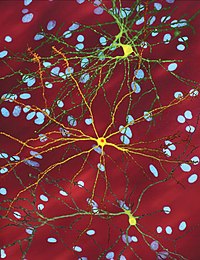
Photo from wikipedia
INTRODUCTION Alzheimer's Disease (AD) is a progressive, neurodegenerative disease that severely affects affected individuals' cognitive abilities, memory, and quality of life. It affects the elderly population, and there is no… Click to show full abstract
INTRODUCTION Alzheimer's Disease (AD) is a progressive, neurodegenerative disease that severely affects affected individuals' cognitive abilities, memory, and quality of life. It affects the elderly population, and there is no permanent prevention or cures available today, treatments mainly aiming to alleviate the symptoms as and when they appear. Alternate therapeutic approaches are being researched constantly, and there is a growing focus on phytomedicine, herbal medicine, organic compounds, ayurvedic compounds for the treatment of AD. METHODS The current study aims to provide an extensive review of these plants against AD from the currently existing literature. Most relevant keywords like Alzheimer's Disease, phytomedicines, ethnic medicines, the role of phytomedicine in neuroprotection, common phytomedicines against AD etc., were used to select the plants and their metabolites effective in treating AD. The study focuses on six plants: Panax ginseng, Ginkgo biloba, Bacopa monnieri, Withania somnifera, Curcuma longa, and Lavandula angustifolia. Their active components have been studied alongwith, neuroprotective properties, and evidence of in-vitro, pre-clinical studies, and clinical studies conducted to prove their therapeutic potential against the disease have been presented. RESULTS All plants envisaged in the study show potential for fighting against AD to varying degrees. Their compounds have shown therapeutic effect by reversing the neurological changes such as clearing Aβ plaque and neurofibrillary tangle formation, and ameliorative effects against neurodegeneration through processes including improving concentration, memory, cognition and learning, higher working and cue memory, improved spatial memory, inhibition of NF-κB expression, inhibiting the release of pro-inflammatory cytokines, inhibition of AChE and lipid peroxidase enzymes, and reduction of interleukin levels and tumor necrosis factor-alpha. CONCLUSION The present review is a comprehensive and up-to-date analysis supported with the evidentiary profs from pre-clinical studies, meta-analyses, and review papers related to natural phytochemicals' impact on neurodegenerative disorders like AD.
Journal Title: Current Alzheimer research
Year Published: 2022
Link to full text (if available)
Share on Social Media: Sign Up to like & get
recommendations!